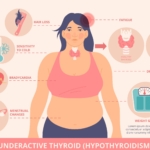Reduce Thyroid Medication By Losing Weight And Eating Balanced Diet – Weight loss and a balanced diet may be able to help some people with thyroid conditions reduce their medication requirements. This is because weight gain and an imbalance in the diet can affect the way the body uses hormones, which can have an impact on thyroid hormone levels. In this blog, we have provided beneficial information on how a person can Reduce Thyroid Medication By Losing Weight And Eating Balanced Diet.

The thyroid hormone helps to regulate metabolism, and when the thyroid gland is not functioning properly, a person’s metabolism may be affected. This can lead to weight gain and difficulty in losing weight. By losing weight and eating a balanced diet that is low in processed foods and high in fruits, vegetables, and lean protein, a person can able to help regulate their metabolism and improve their thyroid function.
However, it’s important to keep in mind that every person’s body is different and what may work for one person may not work for another, always consult with the doctor to adjust the medication. Losing weight and eating a balanced diet can be beneficial for overall health, but they should not be used as a replacement for thyroid hormone replacement therapy without consulting a healthcare professional.
Factor That Can Affect Thyroid Medication
There are several factors that can affect the effectiveness of thyroid medication, including:
Medication dosage: To treat specific thyroid dysfunction, thyroid medication must be given at the correct dose. An overactive or underactive thyroid could be the result of incorrect medication.
Food and drink: It’s important to be aware of how certain foods and drinks such as soy and coffee, can affect the way your body absorbs thyroid medicine.
Weight changes: Weight changes can affect the metabolism of thyroid hormones and may result in changes in medication dosage.
Hormonal changes: Hormonal changes due to pregnancy or menopause can affect the metabolism of thyroid hormones and may require adjustments to medication dosage.
Compliance: Some patients may struggle to remember to take their medicine on a regular basis or to get their prescriptions filled, which can affect the efficacy and consistency of the medication’s therapy.
How To Reduce Thyroid Medication By Losing Weight And Eating a Balanced Diet
If an individual is taking medication for an overactive thyroid (hyperthyroidism) and is able to lose weight, their thyroid hormone levels may decrease, allowing for a reduction in medication. However, this process should be supervised by a healthcare professional, as sudden changes in medication can be dangerous.
Reduce Thyroid Medication By Losing Weight
It is also essential to note that weight loss alone might not be enough to reduce the medication dosage, so it’s important to work closely with endocrinologists to monitor the levels and adjust the treatment accordingly.
In order to lose weight, an individual should focus on a healthy diet that includes a variety of fruits, vegetables, whole grains, lean protein, and healthy fats. In addition to diet, regular exercise, and physical activity can help to increase energy expenditure and promote weight loss.
It is also important to manage stress levels and get adequate sleep, as these can both affect weight and thyroid hormone levels.
Always remember that any therapy changes should be based on a doctor’s appointment, and that self-adjusting dosages without a doctor’s supervision are not advised.
Diet Plan To Reduce Thyroid
Eating a balanced diet can be an effective way to manage an overactive thyroid (hyperthyroidism) and potentially reduce the need for medication.
A diet that is rich in fruits, vegetables, whole grains, lean protein, and healthy fats can provide the necessary nutrients to support the health of the thyroid gland. It is also important to limit or avoid foods that are known to interfere with thyroid function, such as soy, cruciferous vegetables (like broccoli, cauliflower, and cabbage), and large amounts of goitrogenic foods like millet, peaches, and spinach.
Certain vitamins and minerals, such as selenium, zinc, and vitamin A, can also support the health of the thyroid gland. These can be found in foods such as seafood, nuts, seeds, and eggs.
To create a meal plan that suits the person’s condition and helps in achieving the desired hormone levels, working closely with an endocrinologist or dietitian would be very beneficial.
It is important to keep in mind that diet alone may not be enough to reduce medication dosage, and any changes to medication should be made under the supervision of a healthcare professional.
Conclusion
It is important to note that these changes may not be enough to completely stop the medication, as every patient’s body reacts differently and the medication is tailored to the individual. So it’s best to discuss with the doctor about adjusting the medication or stopping it.






